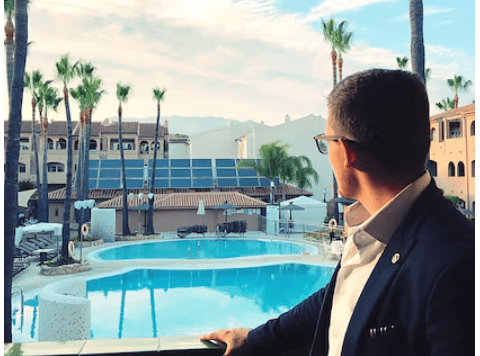By adopting the philosophy of “affordable luxury,” which has significantly enhanced the hospitality industry over the last ten years, hotels have started to dramatically alter their appeal. Brands are quite similar in their efforts to offer intensely intimate, physically stunning, and culturally linked experiences—all without offending budget-conscious tourists—instead of competing on gilded extravagance. The modern urban explorer is a new type of visitor for whom this strategy has proven very advantageous.

Hotels like CitizenM and The Hoxton are offering more than just a bed; they are offering a story through the integration of guest-centric design, hyperlocal storytelling, and tech-enabled service. The purpose of these establishments becomes very evident as soon as one enters their lobby areas: they are designed for tourists who desire luxury without fear, community without compromise, and elegance without rigidity. These visitors aren’t necessarily looking for 500-thread-count bedding or turndown service. Rather, they are inspired by the idea of exploring a city on foot, by insider information posted on neighborhood bulletin boards, or by casually hearing it from a barista who knows the area like family.
Key Information on Affordable Luxury Hotels for Urban Explorers
| Category | Details |
|---|---|
| Primary Guest Profile | Millennials, Gen Z, creative professionals, remote workers |
| Core Value Proposition | Experience-driven stays with design, wellness, local immersion, and personalization |
| Defining Features | Boutique interiors, curated activities, eco-conscious amenities, communal energy |
| Leading Examples | Moxy Hotels, Hoxton, CitizenM, The Line, 25hours Hotels |
| Hospitality Strategy | Blending affordability with sophistication, emotion-driven marketing, lifestyle storytelling |
| Industry Reference |
The change has philosophical underpinnings in addition to being just aesthetic. Hotels are purposefully putting human connection, carefully chosen design, and hyperlocal culture ahead of marble columns or rooftop butlers by emphasizing experience value. This recalibration is best illustrated by Marriott’s cheeky sub-brand, Moxy. There are community lounges teeming with interactive digital murals, DJ sets, and art displays instead of doormen or extravagant suites. An very effective method of combining affordability with creating memories is to allow guests to check in through an app, mix their own drinks, and socialize freely.
Amazingly adaptable areas now serve as pop-up poetry salons at night and co-working lounges throughout the day. Because it turns square feet into a lifestyle product rather than merely a service area, this redefinition is especially creative. The benefits of these dynamic forms extend well beyond the cost of the reservation; visitors experience engagement and even emotional investment. For example, Austin’s The Line Hotel works with regional musicians and artists to produce revolving material that captures the essence of the city’s culture. These partnerships have a purposeful, non-performative character, and the end product is an experience that speaks to contemporary aesthetics and ideals.
The definition of affordable luxury has broadened over the last five years to encompass wellness, not through lavish spa menus but rather through essential programming. These days, hotels provide plant-based meals from nearby farms, digital detox packages that lock away your phone, and morning rooftop yoga with city views. These well-considered products are incredibly successful at raising perceived value while maintaining operational cost-consciousness. Visitors enjoy a high-end lifestyle that fits not just their budgets but also their goals.
Brands have learnt to accomplish more with less, especially in metropolitan areas where attention spans are short and real estate is expensive. Luxurious micro-rooms with ergonomic designs, blackout curtains, and top-notch mattresses are combined with vibrant common areas where visitors can work, eat, and have fun. This arrangement reflects the habits of the contemporary traveler, who expects their base to seem like an Instagrammable haven despite spending more time traveling than resting.
Brands have gained access to communities outside of their own marketing reach through strategic alliances. Pharrell Williams co-founded the Goodtime Hotel in Miami, which attracts guests looking for peace in the midst of commotion with its design-forward vibes and wellness-focused programming. Similar wellness packages are offered by Gwyneth Paltrow’s Goop in boutique hotels, creating holistic experiences that combine spa treatments, mindfulness, and nutrition without the usual five-star price tag.
The emotional tone of the event is what sets this trend apart from simple cost-cutting hospitality. Employees are taught in storytelling as well as customer service, exposing visitors to the best jazz bar in town, the secret bookshop that serves coffee until midnight, or the late-night street vendor whose dumplings attract residents from all over the city. The visitor feels incorporated into the location rather than merely accommodated because to these linkages, which give the stay a rich texture. This kind of interaction turns into a very powerful loyalty booster when used in conjunction with emotional branding.
Affordable luxury houses that are exquisitely sophisticated and surprisingly affordable frequently serve as boutique cultural ambassadors. Every element feels purposeful and grounded in place, whether it’s secondhand furniture from local markets or reclaimed factory walls transformed into canvases for art. Another crucial factor is the sustainability perspective. Not because it’s trendy, but because their guests are sophisticated enough to care, hotels are implementing eco-friendly materials, low-waste kitchens, and energy-efficient systems.
This movement grew even more during the pandemic as tourists looked for a reason to spend every dollar. The value of emotional resonance, trust, safety, and adaptability increased. With their agile designs and user-friendly amenities, inexpensive luxury hotels proved to be incredibly dependable throughout these unstable times. From holding hybrid meetings to providing contactless check-ins, their ability to change course demonstrated an operational agility that is uncommon in traditional luxury brands.
The competition will probably get more fierce in the upcoming years. However, it is anticipated that this pressure would strengthen the idea rather than weaken it. The philosophy is already being adopted by up-and-coming locations. Properties that redefine luxury stays with soul include Cape Town’s Gorgeous George, Bangkok’s Siam@Siam, and Lisbon’s LX Boutique Hotel. Despite having very distinct locations, these hotels have a lot in common: personal connection, inventiveness, and genuineness.
